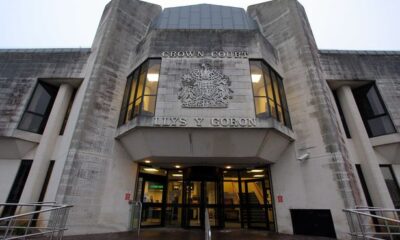Politics
Welsh Surgeon Faces Fraud Charges Over Amputation Claims

A Welsh surgeon has been charged with fraud after allegedly lying to insurers about the circumstances surrounding the loss of his legs. Neil Hopper, a 49-year-old vascular surgeon from Aberystwyth, is facing two counts of fraud by false representation and an additional charge of encouraging others to commit grievous bodily harm.
Hopper, now residing in Truro, Cornwall, appeared at Cornwall Magistrates’ Court on Wednesday. The allegations suggest that between June 3 and June 26, 2019, he falsely represented to insurers that his leg injuries resulted from sepsis and were not self-inflicted.
In a related charge, it is alleged that between August 21, 2018, and December 4, 2020, Hopper purchased videos from The EunuchMaker website. These videos reportedly encouraged an individual, Marius Gustavson, to remove the body parts of others. The nature of these allegations has raised significant concerns given Hopper’s background as a surgeon who performed numerous amputation procedures prior to his own leg amputations.
Since March 2023, Hopper has not been employed by the Royal Cornwall Hospitals NHS Trust. Following his initial arrest, the Medical Practitioners Tribunal Service implemented restrictions on his practice while the General Medical Council conducted an investigation. He has been suspended from the medical register since December 2023.
A spokesperson for the Royal Cornwall Hospitals NHS Trust confirmed that the organization has been cooperating closely with Devon and Cornwall Police throughout the investigation. They emphasized that the charges are unrelated to Hopper’s professional conduct and there is no evidence suggesting any risk to patients.
Hopper’s employment at the Royal Cornwall Hospitals spanned from 2013 until his suspension. Patients who may have concerns about their treatment during his tenure are encouraged to reach out to the hospital’s patient experience team for assistance.
Magistrates have remanded Hopper into custody, with a scheduled appearance before Truro Crown Court on August 26, 2023. The case continues to unfold, capturing attention due to its serious implications for medical ethics and patient safety.
-

 Entertainment3 months ago
Entertainment3 months agoAnn Ming Reflects on ITV’s ‘I Fought the Law’ Drama
-

 Entertainment4 months ago
Entertainment4 months agoKate Garraway Sells £2 Million Home Amid Financial Struggles
-

 Health3 months ago
Health3 months agoKatie Price Faces New Health Concerns After Cancer Symptoms Resurface
-

 Entertainment3 months ago
Entertainment3 months agoCoronation Street’s Carl Webster Faces Trouble with New Affairs
-

 Entertainment3 months ago
Entertainment3 months agoWhere is Tinder Swindler Simon Leviev? Latest Updates Revealed
-

 Entertainment4 months ago
Entertainment4 months agoMarkiplier Addresses AI Controversy During Livestream Response
-

 World2 weeks ago
World2 weeks agoBailey Announces Heartbreaking Split from Rebecca After Reunion
-

 Science1 month ago
Science1 month agoBrian Cox Addresses Claims of Alien Probe in 3I/ATLAS Discovery
-

 Entertainment2 weeks ago
Entertainment2 weeks agoCoronation Street Fans React as Todd Faces Heartbreaking Choice
-

 Health4 months ago
Health4 months agoCarol Vorderman Reflects on Health Scare and Family Support
-

 Entertainment4 months ago
Entertainment4 months agoKim Cattrall Posts Cryptic Message After HBO’s Sequel Cancellation
-

 Entertainment3 months ago
Entertainment3 months agoOlivia Attwood Opens Up About Fallout with Former Best Friend





















